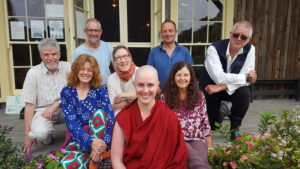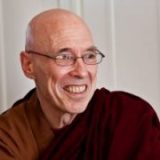

More and more we find accomplished lay teachers and sincere lay practitioners devoting their lives to the Dharma. So why do we need monastics at all?
Buddhism as it meets with the contemporary world gives rise to the need to create, from within the resources of the Dharma, methods and practice that offer valid means to alleviate the suffering of countless beings as they face the challenges of modern life.
The Dharma methods offered must be relevant and palatable for people so they can put them into practice. In doing so however it is essential that we do not water down the Dharma to make it more appealing to people. If we do so, then Dharma has lost its essence. The Buddha was not showing us how to have a more comfortable, pleasant samsara. He was showing us how to wake up from the dream of samsara altogether.
Monastics, one may argue, belong to a time and a tradition that has no relevance to our modern world and that they are no longer needed. This is a very important question to consider. The monastic institution has been in place for more than 2,500 years – longer than the Roman Empire, The British Empire, The Chinese Emperors – and yet there is no guarantee that it will survive.
It is a living tradition, entirely dependent upon each new generation of monks and nuns to uphold and embody its core aim – the determination to be free, to renounce suffering and the causes of suffering.
Renunciates have a role beyond their own evolution. They act as symbols of the possibility to wake up from suffering – and all the more so when that suffering presents itself as a comfortable samsara. Renunciation does not mean turning away from life but on the contrary, they fully engage in their true responsibilities to the world.
Monastics, to remain relevant must meet the challenges of the modern world and at the same time, by their very presence have a crucial role to play in offering challenges to the modern world. Society now is based principally on greed and promotes the view that happiness depends mainly on acquisition and the satisfaction of desire. Sex and violence rage everywhere nowadays. In contrast, the sangha is a group of monastics whose lives are based on renunciation, purity, restraint, and discipline, all of which are aimed at reducing our wants and desires. What these people do goes completely against the current of the world. By their peaceful manner and inner happiness, the monks and nuns challenge others to see that the way to happiness lies in mastery of sensual desires, not in their indulgence.
A sense of refuge, renunciation, compassion based on the perception of universal suffering, a striving to break all mental bonds and fetters—surely these values are difficult in an age of easy pleasure. But these are all so fundamental to the true Dhamma, so closely woven into its fabric, that to delete them is to risk nullifying its liberative power. If this means that Buddhism retains its character as a religion, so be it. In this I see nothing to fear; the greater danger is in diluting the teaching so much that its potency is lost. The secularization of life and the widespread decline in moral values have had grave consequences throughout the world, jeopardizing our collective sanity and survival.
The history of Buddhist monasticism and its Western adaptation – by Bhikshuni Karma Lekshe Tsomo in Blossoms of the Dharma—Living as a Buddhist Nun
From Blossoms of the Dharma: Living as a Buddhist Nun, published in 1999. This book, no longer in print, gathered together some of the presentations given at the 1996 Life as a Buddhist Nun conference in Bodhgaya, India.
The Challenge to the Sangha in the 21st Century – by Ven. Bhikkhu Bodhi
Our modern world needs a secular Buddhism – not a religious Buddhism. Surely the religious aspect is no longer necessary?
Why we need monasticism – A panel discussion with Robert Thurman, Jan Chozen Bays, Bhikkhu Bodhi and Ayya Tathaaloka. Introduction by Ajahn Amaro.
..For those who were born and raised in the west, the encounter with Buddhism—and Buddhist monasticism in particular—raises questions such as: How important is it for the monastic path to be an element in Western Buddhism? Will women ever have an equal place in the monastic order? …What will it look like in the West?
Prof. Robert Thurman’s talk from first conference of Western Buddhist teachers with His Holiness the Dalai Lama, in Dharamsala, India, March 1993
“…If you remove monasticism from a social mix, what happens is that all the productive energy of people has nowhere to go but into over-production of everything.”




